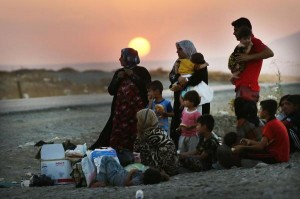8/12/2014

France to its credit, or perhaps because of its unique experience in the Levant, especially Lebanon, Syria and to some degree Iraq, has kept the issue in the headlines.
source
PARIS — The headlines seem from another era, if not century; that of Christian persecution by militant Islam in the Middle East. Yet the modern political responses to this age-old conflict appear ambivalent to what’s emerged as an organized attempt by the militant Islamic State of Syria and Levant to impose a caliphate both on Christians as well as more secular Muslims.
And yes, remind yourself this is the 21st century!
Three forces have opposed this modern day persecution: the Catholic Church as one would expect, the United Nations, crucial in a political sense, and French public opinion.

An Iraqi family driven from Mosul wait to enter a temporary displacement camp on July 3 in Khazair, Iraq. /Spencer Platt/Getty Images
Pope Francis said, “To find the martyrs, it’s not necessary to go to the catacombs or the Coliseum. The martyrs live in a number of countries. The Church of the 21st century is a Church of the martyrs.”
UN Secretary General Ban Ki-Moon called the persecutions, “A crime against humanity.”
UN Secretary General Ban Ki-Moon called the persecutions, “A crime against humanity.”
In a special statement on religious minorities in Mosul, Iraq, the members of the UN Security Council “express their deep concern over reports of threats against religious and ethnic minorities in Mosul and other parts of Iraq controlled by the Islamic State in Iraq and Levant (ISIL) including the ultimatum to Christians to either leave the city, stay and pay a tribute, convert to Islam, or face imminent execution.” The Council condemned in the “strongest terms the systematic persecution of individuals from minority populations and those who refuse its extremist ideology in Iraq.”
Though the U.S. government has grudgingly conceded the scope of the problem, especially since June when jihadi militants seized large parts of northern Iraq threatening ancient Christian communities in Mosul and Nineveh province, more than two months into the crisis, the Obama administration launched limited airstrikes on the terrorists and expanded humanitarian assistance for the refugees.
Yet, few countries besides France, view the persecution both as a political as well as a humanitarian problem.
France to its credit, or perhaps because of its unique experience in the Levant, especially Lebanon, Syria and to some degree Iraq, has kept the issue in the headlines.
In a poll for the respected French daily Le Figaro, two out of three respondents say the government should intervene to protect the Christian minority. A front page editorial added, “The long silence of the West is a moral fault, and it’s a geopolitical error. It not only has to do with the cross, the star, or the crescent, what is in play is a cultural richness, a model of society and a political future.” It questioned whether minorities in Arab countries will be “put under the sword of the Caliph.”
Christians have been rooted in the Middle East for two thousand years. Since the “Arab Spring” of 2011, which jolted the largely sectarian but authoritarian order, there’s been an explosion of legitimate political aspirations as well as an implosion of dark intolerant forces which have shattered the social order.
The crossfire of inter-Islamic Sunni/Shiite conflict has reemerged with a vengeance, ethnic strife has erupted, and Christian minorities especially the Copts of Egypt, and the Christians in Syria and Iraq have become scapegoats for a vengeful new order which will ultimately consume itself.
During Syria’s bitter civil war, an admittedly authoritarian but secular Assad regime is locked in battle with a gaggle of rebel groups, many of whom sadly are not freedom fighters as often portrayed in the West, but hardline Islamic jihadis. In the town of Maaloula, forty miles north of Damascus, the 5,000 member Christian enclave, one of the world’s oldest Christian communities, still speaks Aramaic, the language of Jesus Christ, along with Arabic.
According to the French humanitarian group, SOS Christians of the Orient, Churches and convents have been targeted by the terrorists “in a hatred reserved specifically for Christians.” Though large parts of Maaloula have been devastated by the militants, the SOS group is working to rebuild the church of St. George this August as one small step towards restoring normalcy.
The crisis for believers in Iraq is even more acute. Today there are approximately 400,000 to 500,000 Christians in the country, about half the number which existed in 2003 before the Anglo/American invasion. In the last few years and especially since June, attacks on Christian communities have multiplied as an ineffective Iraqi government lost effective control.
According to Msgr. Louis Sako, patriarch of the Chaldean church, “These wars and persecutions are a return to the Middle Ages. Hunting down people for reasons of faith, this is barbarism and savagery. In the name of what can you force these people to convert to Islam? It is against liberty and human rights.”
In an extraordinary interview in Le Figaro, a leading French philosopher Pascal Bruckner, speaking of ISIL adds, “When they come to power they inscribe their symbol N(Nazarene) on the door of Christians which reminds us of the yellow star of the Jews in the Second world war.” How long can we continue to look the other way?
John J. Metzler is a U.N. correspondent covering diplomatic and defense issues. He writes weekly for WorldTribune.com. He is the author of Transatlantic Divide ; USA/Euroland Rift (University Press, 2010)
source
No comments:
Post a Comment